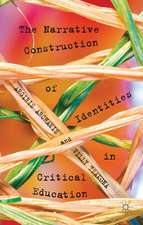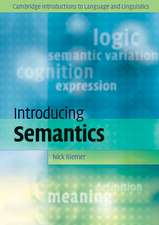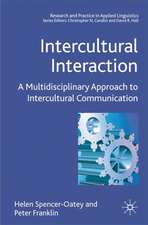Challenges and Opportunities in Public Service Interpreting
Editat de Théophile Munyangeyo, Graham Webb, Marina Rabadán-Gómezen Limba Engleză Hardback – 5 iul 2016
Preț: 425.44 lei
Preț vechi: 500.51 lei
-15% Nou
Puncte Express: 638
Preț estimativ în valută:
81.42€ • 84.69$ • 67.22£
81.42€ • 84.69$ • 67.22£
Carte disponibilă
Livrare economică 25 martie-08 aprilie
Livrare express 08-14 martie pentru 31.41 lei
Preluare comenzi: 021 569.72.76
Specificații
ISBN-13: 9781137449993
ISBN-10: 1137449993
Pagini: 240
Ilustrații: XIII, 246 p.
Dimensiuni: 148 x 210 x 20 mm
Greutate: 0.45 kg
Ediția:1st ed. 2017
Editura: Palgrave Macmillan UK
Colecția Palgrave Macmillan
Locul publicării:London, United Kingdom
ISBN-10: 1137449993
Pagini: 240
Ilustrații: XIII, 246 p.
Dimensiuni: 148 x 210 x 20 mm
Greutate: 0.45 kg
Ediția:1st ed. 2017
Editura: Palgrave Macmillan UK
Colecția Palgrave Macmillan
Locul publicării:London, United Kingdom
Cuprins
General Introduction. -PART I: The present and the future of the public service interpreting marketplace. -Introduction to PART I. -Chapter 1: Assessing current stakeholders’ needs and expectations. -Chapter 2: Professionalisation and standardisation of Public Service Interpreting. -Chapter 3: Stakeholders’ guide and handbook. -Chapter 4: Fit-to-practise versus exam-ready legal public service interpreter training; training for real-life or for the exam?. -Chapter 5: Towards a Unified Model for Interpreter User Training in Communication via an Interpreter: The Norwegian Experience. -PART II: The interface of interpreter mediated encounters and training opportunities in public service interpreting. -Introduction to PART II. -Chapter 6: Insight into ethical dilemmas in Public Service Interpreting and interpreters’ training needs. -Chapter 7: Public Service Interpreting and Business Negotiation Interpreting: Friends or Foes?. -Chapter 8: Foreigners before Themis: Legal Interpreting in Greece. -General Conclusion.
Notă biografică
Dr Théophile Munyangeyo is Senior Lecturer at Leeds Beckett University. With extensive teaching experience involving semantics, pragmatics, communication theories and models, translation and Consecutive Interpreting, he is a Higher Education Academy Senior Fellow. He is the Course Leader for Public Service Interpreting provision, member of editorial boards of international journals and PhD research supervisor in language learning and teaching.
Graham Webb was Principal Lecturer in Spanish at Leeds Beckett University from 1991 to his retirement in 2013. He taught translation and consecutive interpreting. Now a freelance translator of academic texts on aspects of pedagogy, especially assessment, he also acts as a mentor on several youth enterprise schemes.
Marina Rabadán-Gómez is Lecturer in Spanish at the University of Liverpool where she teaches Spanish language and communication skills. She previously worked at Manchester Metropolitan University and Leeds Beckett University. Her research interests are in communication theories and pragmatics as well as in translation and interpreting applied to language teaching.
Textul de pe ultima copertă
Public Service Interpreting is a hugely complex activity, encompassing human, ethical, commercial and political dimensions. It is unseen and unrecognized by most of the population but vital to those who depend on it for their security or wellbeing. The quality of PSI provision is seen by the authors as a clear indicator of how a society views and responds to the realities of a multi-ethnic and multilingual global community. Following recent significant changes in the power balance between them this book explores the increasing tensions among multiple stakeholders who together deliver such a fundamental service in a modern open society. Chapters focus on how all stakeholders need to appreciate the wider context of political and economic realities whilst collaborating more responsibly to deliver the conditions, training and support needed for expert linguists to be attracted to and retained in this vital profession.
Dr Théophile Munyangeyo is senior lecturer at Leeds Beckett University. With extensive teaching experience involving semantics, pragmatics, communication theories and models, translation and Consecutive Interpreting, he is a Higher Education Academy Senior Fellow. He is the Course Leader for Public Service Interpreting provision, member of editorial boards of international journals and PhD research supervisor in language learning and teaching.
Graham Webb was Principal Lecturer in Spanish at Leeds Beckett University from 1991 to his retirement in 2013. He taught translation and consecutive interpreting. Now a freelance translator of academic texts on aspects of pedagogy, especially assessment, he also acts as a mentor on several youth enterprise schemes.
Marina Rabadán-Gómez is Lecturer in Spanish at the University of Liverpool where she teaches Spanish language and communication skills. She previously worked at Manchester Metropolitan University and Leeds Beckett University. Her research interests are in communication theories and pragmatics as well as in translation and interpreting applied to language teaching.















